In 2021, approximately 41.7 million adults in the United States sought treatment or counseling for their mental health. This statistic reflects a growing awareness of the importance of mental health care. It is undoubtedly a positive shift in society, where mental health is no longer stigmatized, and individuals do not require a severe mental health issue to seek help.
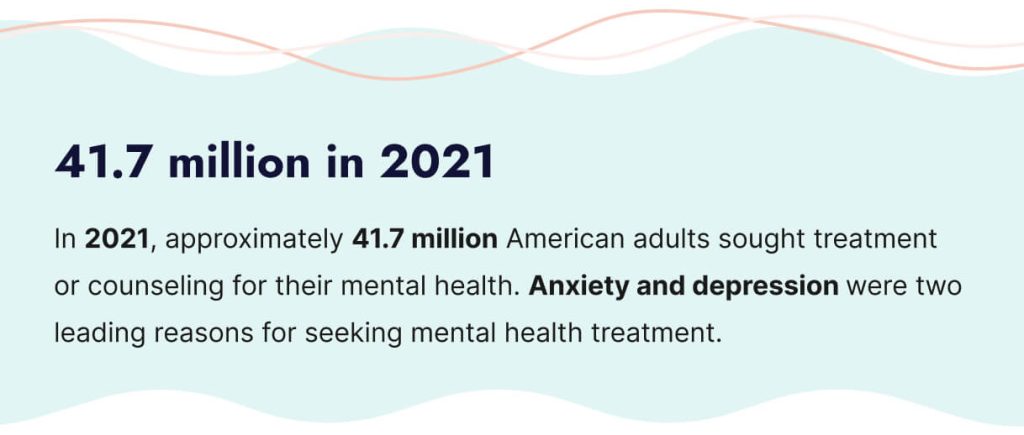
When students contemplate options for mental health care, they may find themselves uncertain about where to begin or how to choose the right professional. First, this article clarifies the distinction between psychologists and psychotherapists. Further, you will find a guide on starting the journey towards improving your mental well-being.
Read on to learn the difference between a psychotherapist and a psychologist. Don’t miss our extensive psychology essay database, where you can find many materials on mental health-related topics.
👨🔬 PSYCHOLOGIST – Explained
- Education. A doctoral degree in psychology, such as a Ph.D. or Psy.D.
- License. Must earn a doctorate, pass a state licensure exam, and complete supervised experience.
- Functions. Assessing and diagnosing mental health conditions, creating treatment plans, and offering various forms of therapy to individuals, couples, families, and groups.
- Limitations. No authority to prescribe medication.
- Approaches. Various theoretical approaches, such as cognitive-behavioral therapy, psychodynamic therapy, and humanistic therapy.
Who Is a Psychologist?
A psychologist is a medical professional who holds a doctoral degree in psychology. They specialize in talk therapy and have extensive psychological diagnosis and testing training. Some psychologists also engage in research and may pursue a Doctor of Philosophy degree, while others concentrate on clinical practice and attain a Doctor of Psychology degree.
Psychologists primarily do the following work:
- Investigate human behavior,
- Focus on understanding how individuals think and behave,
- Explore how people respond to both internal and external factors, as well as their thoughts, emotions, and motivations,
- Study cognitive functions like learning, memory, and child psychological development.
Psychologists may specialize in clinical psychology, counseling, or forensic psychology in healthcare settings. More qualified psychologists may pursue roles as psychological well-being practitioners or high-intensity therapists.
⚠️ Note that while psychologists provide therapy and counseling, they are not authorized to prescribe medication.
Who Might Need a Psychologist?
Students often experience various emotional challenges that significantly impact their well-being and daily functioning. Recognizing when to seek assistance from a psychologist is the first step in taking care of your mental health.
Indicators that you might benefit from consulting a psychologist:
- Overwhelming feelings. Persistent sensations of being overwhelmed by daily tasks, responsibilities, or emotions.
- Fatigue and exhaustion. Experiencing chronic declines in energy levels that affect your daily routine.
- Anger issues. Difficulty managing and controlling your anger, including outbursts or heightened aggression.
- Panic attacks. Recurrent, sudden episodes of intense fear, often accompanied by a rapid heart rate, sweating, and difficulty breathing.
- Anxiety. Constant excessive worry and fear interfere with daily activities and cause significant distress.
- Apathy and lack of interest. Feeling disinterested, unmotivated, and experiencing a lack of enjoyment in once pleasurable activities.
- Disrupted sleep patterns. Persistent difficulty falling asleep or staying asleep, nightmares, or sleep disturbances that impair daily functioning.
- Changes in appetite. Significant shifts in eating habits, appetite, or noticeable fluctuations in weight may indicate emotional distress.
- Difficulty coping with stress. Struggling to manage stress effectively increases irritability, restlessness, or a constant sense of being on edge.
- Social withdrawal. Retreating from social interactions, isolating yourself, or avoiding activities and relationships that were once sources of enjoyment.
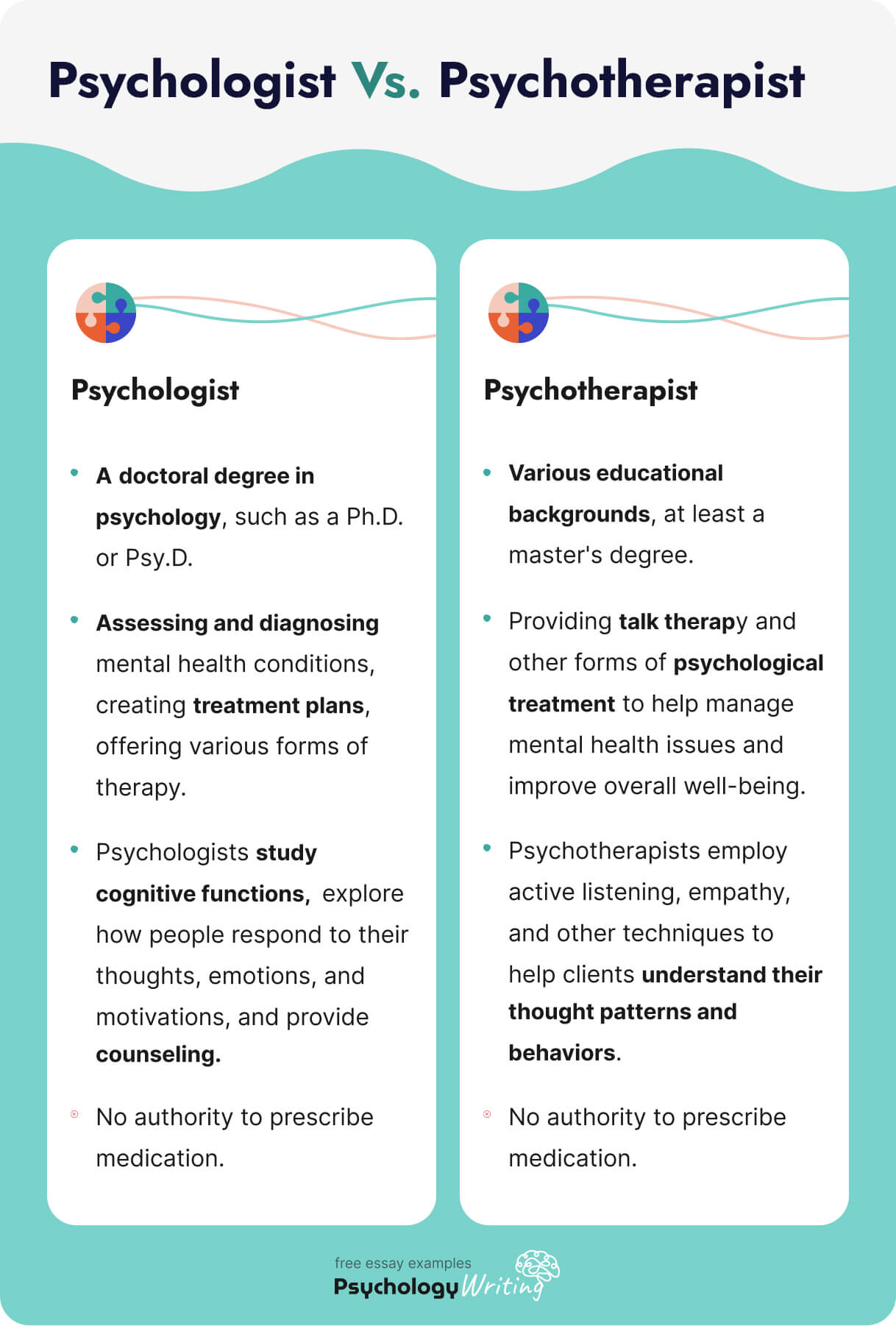
💆 PSYCHOTHERAPIST – Explained
- Education. Various educational backgrounds, such as social work, counseling, or psychology. It must be at least a master’s degree in the respective field.
- License. Requirements vary by state and discipline. One must meet the requirements set by their state’s board of behavioral sciences or equivalent regulatory body.
- Functions. Providing talk therapy and other kinds of psychological treatment to help clients regulate mental health issues and refine overall well-being.
- Limitations. No authority to prescribe medication.
- Approaches. Cognitive-behavioral therapy (CBT), dialectical behavior therapy (DBT), psychodynamic therapy, humanistic therapy, etc.
Who Is a Psychotherapist?
A psychotherapist is a professional who assists individuals, couples, families, and groups in approaching emotional, behavioral, and relationship issues. They are competent in providing talk therapy and employ different techniques to help clients gain insights into their thoughts and emotions. Psychotherapy ultimately facilitates major life improvements for the patients.
Psychotherapists’ major functions are:
- Addressing trauma, addiction, grief, anxiety, depression, and interpersonal conflicts,
- Aiding clients in managing stress,
- Improving patients’ communication skills,
- Assisting in coping strategies development.
These professionals often hold advanced degrees in psychology, counseling, social work, or psychiatry. Some psychotherapists are psychiatrists who have finished medical school and specialized mental health training. Others may have doctoral degrees in psychology or counseling and have undergone intensive clinical training. Additionally, some psychotherapists hold specific certifications or licenses in their niches.
Typically, psychotherapists create a secure and supportive space for clients to reflect on their thoughts and feelings. They employ active listening, empathy, and therapeutic methods to help clients comprehend their thought patterns and behaviors. Through the therapeutic process, clients can cultivate self-awareness, acquire new coping skills, and initiate beneficial changes to improve their well-being.
Who Might Need a Psychotherapist?
Seeking support from a psychotherapist can be a crucial step in addressing and managing various mental and emotional challenges. If you identify with any of the following signs, reach out to a psychotherapist who would assist you in overcoming them.
Indicators that you might use psychotherapist consultations:
- Emotional instability. Experiencing intense mood swings, emotional volatility, or hardship regulating emotions can lead to challenges in daily functioning.
- Relationship issues. Struggling with interpersonal conflicts, communication breakdowns, trust issues, or difficulty maintaining healthy and fulfilling relationships, be it partners, friends, or family.
- Overwhelming homesickness. Experiencing strong homesickness or craving for familiar environments significantly impacts emotional well-being.
- Social anxiety. Feeling extreme discomfort or fear in public, leading to avoidance of social interactions and impacting personal and professional relationships.
- Self-blame and guilt. Engaging in frequent self-blame, harsh self-criticism, and feelings of guilt that affect self-esteem and emotional well-being.
- Frustration and anger management. Struggling to regulate frustration, irritability, or anger leads to difficulties in interpersonal relationships and overall emotional well-being.
- Anxiety and excessive worry. Persistent, excessive worry, fear, or anxiety that interferes with routine activities and relationships.
- Low self-esteem. Struggling with low self-esteem, negative self-image, or a sense of worthlessness impacts confidence and personal growth.
- Unhealthy habits. Engaging in destructive or harmful behaviors, such as alcohol overconsumption, substance abuse, compulsive spending, binge eating, or other addictive patterns that mess with overall well-being.
- Life transitions and adjustment issues. Struggling to adapt to the demands of student life, such as difficulties with academic pressures, transitioning to college or university, managing expectations, building new social networks, and overcoming the challenges of independence and self-sufficiency.
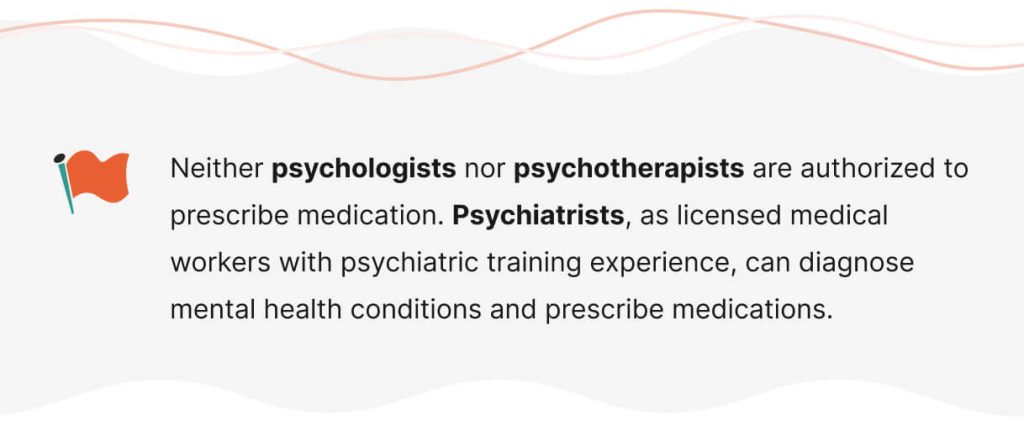
🔎 Approaches to Psychotherapy
Psychotherapy is a diverse field covering many therapeutic methods. As an umbrella term, it includes various theories aimed at helping individuals better their mental health and overall well-being. In this section, we will provide an overview of the various unique principles and practices associated with each one.
Behavioral Therapy
Behavioral therapy suggests that our behaviors are learned and can be unlearned. This kind of therapy helps people to detect and change unhealthy behaviors, such as anxiety, depression, or substance abuse, by employing positive reinforcement and modeling.
Positive reinforcement is an instrument that rewards desired behaviors to encourage their repetition. Another technique used is modeling, which entails learning through imitation and observation of others. For example, therapists may demonstrate healthy behaviors for clients to emulate.
🔸 Behavioral therapy can provide essential assistance when certain behaviors or habits are interfering with daily life or schoolwork. It may also be suitable for students who have difficulty managing their emotions, those who struggle with addiction or substance abuse, or those who experience challenges with social skills or relationships.
Cognitive Behavioral Therapy
Cognitive Behavioral Therapy’s (CBT) fundamental goal is to spot and modify negative thought and behavior patterns. CBT suggests that all our feelings and actions are interconnected. Hence, by controlling our thoughts, we can facilitate our behavior and emotional responses
CBT uses cognitive restructuring and behavioral activation. Cognitive restructuring involves identifying and challenging harmful thoughts, while behavioral activation increases engagement in pleasant activities to counteract depression or anxiety.
🔸 CBT may become a solution for students fighting anxiety, depression, phobias, post-traumatic stress disorder, obsessive-compulsive disorder, substance abuse, and others. It can also assist individuals with relationship issues, stress, anger management problems, and low self-esteem.
Cognitive Therapy
Cognitive therapy concentrates on eliminating negative thought patterns. It helps individuals acknowledge harmful thoughts and substitute them with a positive mindset. The objective is that our thoughts can facilitate our feelings and behaviors, so altering them can result in improved behavior
Cognitive therapy employs unique methods, such as cognitive restructuring, to modify negative thought patterns and behavioral activation to encourage positive activities. It also uses relaxation techniques to help manage stress and anxiety.
🔸 Students who might find cognitive therapy efficient are those combating depression, anxiety, phobias, obsessive-compulsive disorder (OCD), and post-traumatic stress disorder (PTSD).
Humanistic Therapy
Humanistic therapy centers on an individual’s growth, self-awareness, and self-expression. It underlines the belief that each person has the potential to live a fulfilling life and implement positive choices.
This type of therapy uses unique instruments, such as person-centered therapy. In the framework of PC therapy, a specialist creates a non-judgmental environment for the client to analyze their feelings and experiences.
🔸 Humanistic therapy has proven to be salutary for those looking to perfect their self-esteem, self-awareness, and personal development. It can also reap benefits for students fighting anxiety and relationship problems and those trying to be more self-conscious.
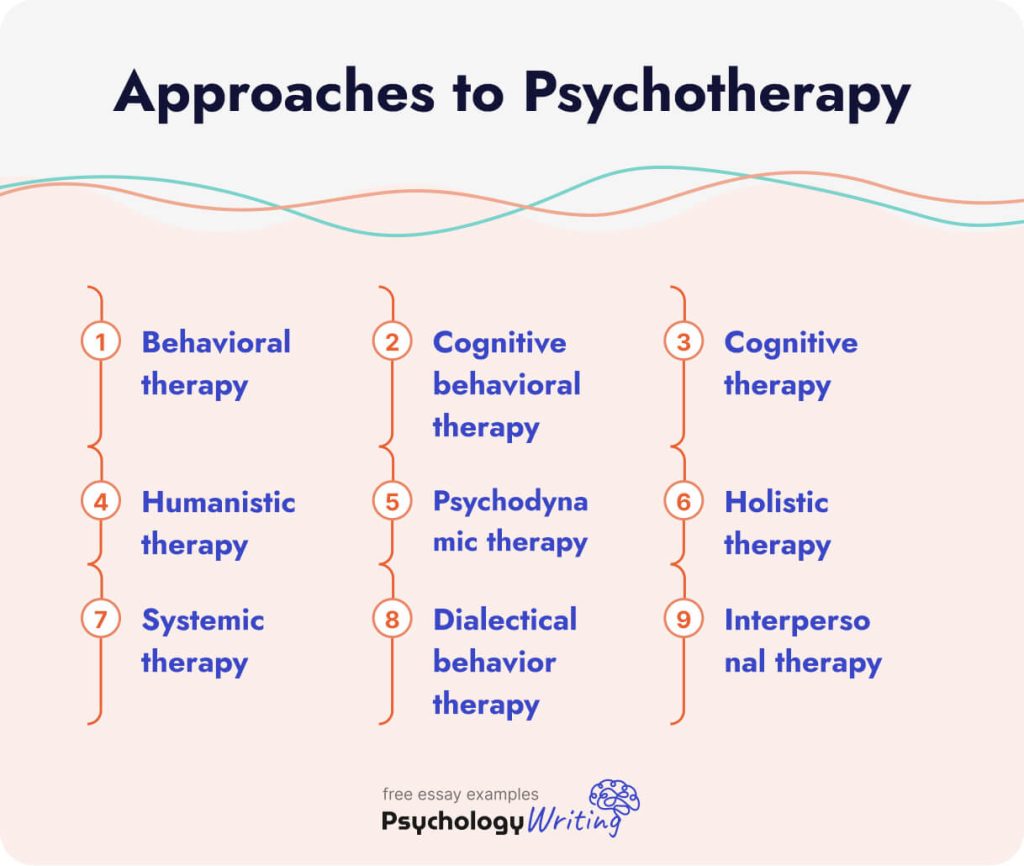
Psychoanalytic/Psychodynamic Therapy
Psychoanalytic/psychodynamic therapy deals with a person’s unconscious thoughts and feelings. By revealing and analyzing this grey area, the approach aids patients in overcoming emotional challenges. This treatment is built on early childhood experiences as a vital element of personality formation.
Psychoanalytic therapy employs unique methods such as free association, where the client freely shares their thoughts and feelings, or dream analysis, where the therapist guides the patient through the meaning of their dreams.
🔸 Psychoanalytic/psychodynamic therapy assists individuals who struggle with deep-seated emotional challenges, repetitive behavior patterns, and unresolved conflicts. Besides, it supports people fighting chronic anxiety, depression, and personality disorders.
Integrative/Holistic Therapy
Integrative or holistic therapy views an individual as a whole, considering their emotions, thoughts, and physical health. The primary goal is to address not only mental and emotional well-being but also physical condition.
The holistic approach utilizes blending techniques from multiple types of therapy: psychodynamic therapy, cognitive-behavioral therapy, and humanistic therapy. It may also integrate alternative practices like meditation or yoga to advance overall well-being.
🔸 Students who might find integrative/holistic therapy advantageous are those in search of a complex approach to address their mental, emotional, and physical well-being.
Systemic Therapy
Systemic or family therapy focuses on individuals within their relationships and broader social systems. The primary emphasis is on analyzing people’s interactions with each other and their surroundings. This approach delves into the influence of family dynamics, relationships, and social contexts on a person’s well-being.
Systemic therapy involves activities such as mapping out family relationships, encouraging open communication, and exploring how behavior patterns within the family or social group can impact an individual’s thoughts and feelings.
🔸 Systemic therapy aims to help individuals who are experiencing family conflicts, relationship issues, or challenges in their social environment.
Interpersonal Therapy
Interpersonal Therapy (IPT) is an approach geared toward perfecting an individual’s relationships and social interactions. It helps people recognize how their relationships and communication with others can affect their mental health.
IPT employs unique techniques and addresses problematic communication patterns. With its help, patients can explore effective ways to express emotions and needs and establish healthy relationship boundaries. This therapy often centers on specific issues such as grief, life transitions, and social isolation.
🔸 Typically, individuals experiencing difficulties in their relationships, struggling with major life changes, or coping with grief or loss choose IPT treatment. It can also be beneficial for those dealing with depression, anxiety, and other mental health issues associated with their social interactions
Dialectical Behavior Therapy
Dialectical Behavior Therapy (DBT) is a therapeutic approach often used to support individuals who struggle with complex emotions and have trouble managing their feelings. DBT provides individuals with coping skills and strategies to effectively handle challenging emotions.
DBT sessions typically involve instruction in mindfulness, which helps people stay focused on the present moment. Additionally, it includes practicing emotion regulation techniques, helping navigate emotions more effectively.
🔸 Students who might find DBT helpful include those dealing with issues like borderline personality disorder, self-harm behaviors, substance abuse, chronic feelings of emptiness, or intense emotional experiences. Furthermore, DBT can be valuable for individuals with mood disorders, anxiety, and depression.
⚖️ Psychologist Vs. Psychotherapist – Who Do You Need?
Both psychologists and psychotherapists are mental health professionals, but they have different roles and qualifications.
Psychologists
Psychologists are competent to perform psychological testing, evaluation, diagnosis, psychotherapy, and counseling. You may seek out these specialists for assistance in identifying and treating depression, anxiety, PTSD, or other disorders. Below are other cases to refer to a psychologist.
- Anxiety – experiencing persistent and overwhelming feelings that disturb your daily functioning, such as panic attacks, phobias, or social anxiety.
- Depression – struggling with constant sadness and losing interest in activities you once enjoyed.
- Trauma and PTSD – going through a traumatic situation, such as physical or emotional abuse, assault, or a natural disaster.
- Eating disorders – dealing with erratic eating patterns, such as anorexia, bulimia, or binge-eating disorder, which are affecting your physical health and emotional well-being.
- Learning challenges – facing constraints related to attention-deficit/hyperactivity disorder (ADHD) or other learning disabilities that are worsening your academic performance and self-esteem.
- Substance abuse – taking drugs or alcohol in a way that adversely impacts your productivity, relationships, and general well-being.
- Relationship issues – suffering from interpersonal conflicts, unhealthy relationship patterns, or difficulties forming and maintaining lasting connections with others.
Psychotherapists
A psychotherapist is a broader term encompassing mental health specialists who do counseling and conduct therapy services. You may turn to a psychotherapist to work on mental health conditions as well as deal with particular challenges. For instance, regulating stress, refining relationships, processing life transitions, etc. Find other grounds to consult a psychotherapist.
- Self-esteem and identity crisis – struggling with low self-esteem, body image insecurities, or issues related to sexual orientation, gender, or cultural identity.
- Grief and loss – coping with the death of a loved one, a significant loss, or struggling with complicated grief that is impacting your emotional condition.
- Stress management – being exhausted by academic pressure, extracurricular activities, and other life stressors, finding it difficult to navigate stress effectively.
- Going through transitions – having trouble accepting significant life transitions: starting college, moving away from home, or adjusting to a new culture or environment.
- Anger management – finding it hard to manage anger, experiencing regular outbursts, or engaging in aggressive behavior that impacts your relationships and well-being.
- Work-life balance – struggling to balance academic demands with your personal life, hobbies, and self-care, experiencing burnout and exhaustion.
- Existential concerns – grappling with questions about the life purpose and existential angst that are causing distress and impacting your well-being.
It’s essential to recognize that every student’s circumstances are unique, and the decision to seek professional help should always be based on individual needs and concerns.
🧠 How to Find a Good Specialist?
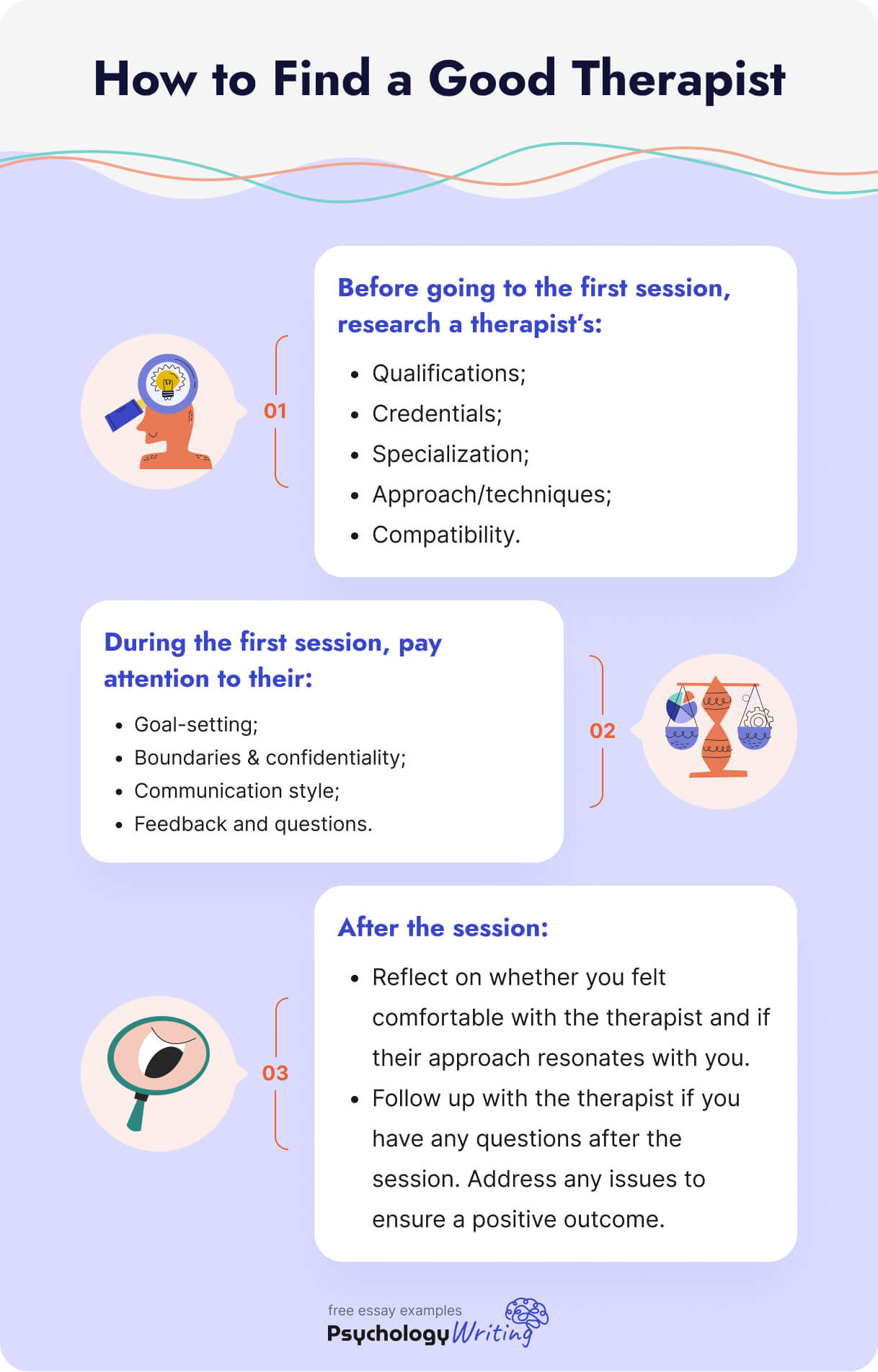
Finding a mental health specialist who truly meets your needs and provides efficient support can be complicated. There is frequently a risk of encountering a non-professional therapist. However, don’t give up on looking for the right mental health expert.
To help you improve this process, we’ve listed the signs to look for when choosing a therapist and, more importantly, what to observe during and after your first session.
- When choosing a therapist:
- Qualifications and credentials: Make sure that the therapist is licensed and has suitable competencies. This comprises checking their educational background, certifications, and professional associations.
- Specialization: For example, if you are seeking counseling for anxiety, finding a therapist with experience and training in that niche is necessary.
- Approach and techniques: Some therapists may utilize cognitive-behavioral therapy, while others rely on psychodynamic or person-centered approaches. Finding a therapist whose approaches align with your wishes and requirements is core.
- Compatibility and rapport: Pay attention to how comfortable you feel with the therapist’s office, its decor, location, and the therapist’s attire.
- During the first session:
- Assessment and goal-setting: The therapist should conduct a thorough analysis to know your needs and goals for therapy. They should also negotiate a treatment plan and set precise goals.
- Boundaries and confidentiality: The therapist should explain their confidentiality policy and discuss any limitations. It is fundamental to ensure that your privacy and personal information are secure.
- Communication manner: Pay attention to the therapist’s interaction and how they listen and react to you. A good therapist should be insightful, supportive, and non-judgmental.
- Feedback and questions: Don’t be afraid to provide feedback and ask questions during the meeting. It is significant to feel relaxed expressing your thoughts and emotions with the therapist.
- After the first session:
- Consider the fit: Reflect on whether you felt safe with the therapist and whether their methods resonate with you.
- Follow-up: Don’t hesitate to follow up with the therapist if you have any unresolved questions after the first consultation. Freely address any discrepancies early to ensure an efficient therapeutic treatment
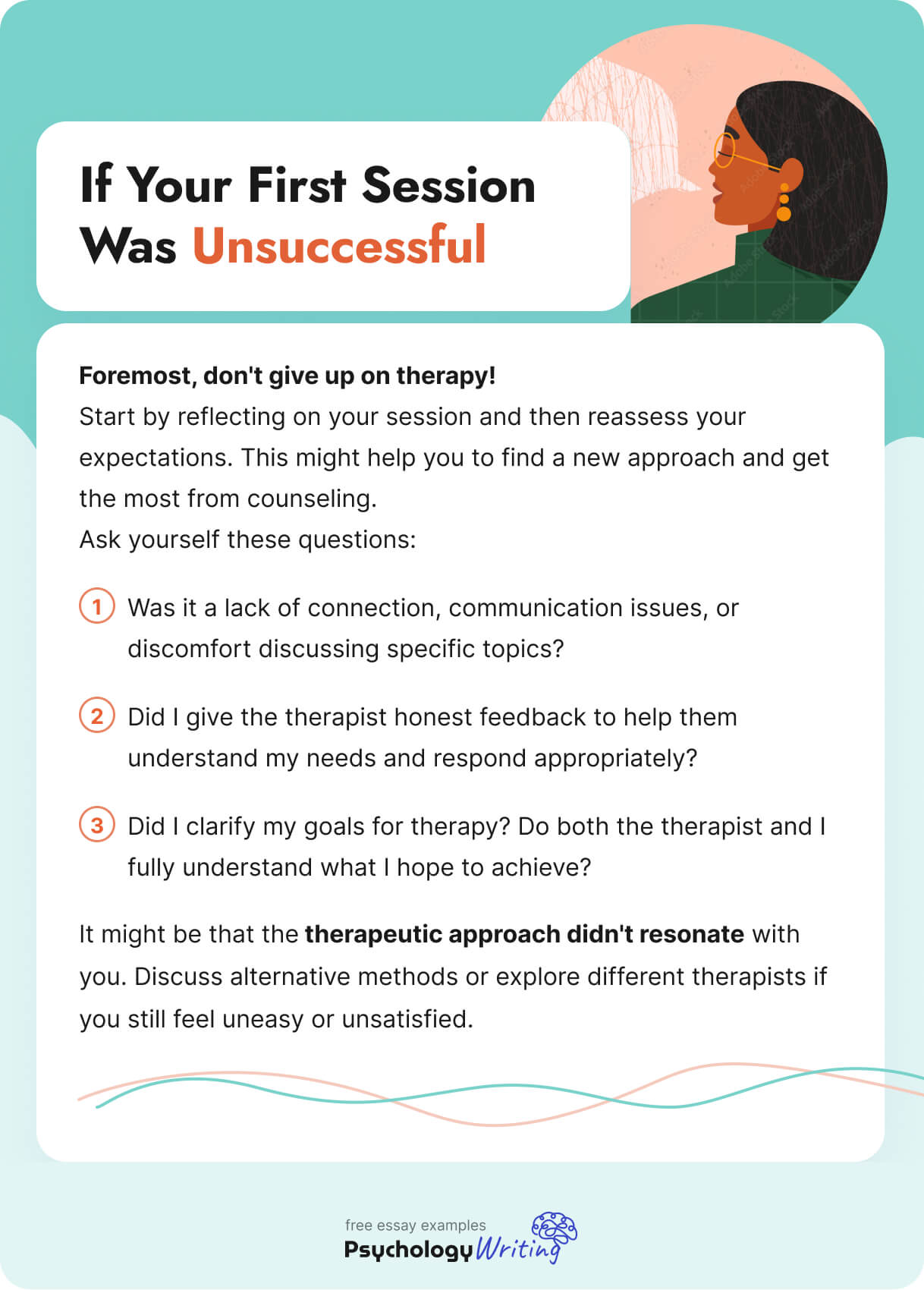
What to Do if the First Session Was Unsatisfactory
If your first therapy session fell short of your expectations, it’s essential to reflect on the experience and consider certain questions.
- First, examine your initial expectations. Your hopes may have been shaped by what you’ve read, heard from others, or seen in the media, and if the therapist’s approach differed significantly, it can be disconcerting.
- Then, assess whether the therapist’s actions were ethically sound. No therapist is infallible, and if you believe they overstepped boundaries or mishandled your information, it’s crucial to work through these concerns. Your comfort and trust in the therapist are fundamental. While therapy can sometimes be uncomfortable, feeling consistently judged may indicate a lack of rapport.
- Finally, review if the therapist is the correct choice for your exact needs. Finding a professional with whom you feel free and who specializes in the spheres relevant to your complaints is vital. Ultimately, a negative first meeting does not mean there is no therapist who can provide the care you need.
🚀 Summary – Psychotherapist Vs. Psychologist
As a student, it’s critical to prioritize your mental health alongside your academic pursuits. The earlier you recognize the importance of mental health treatment and seek support, the earlier you maximize your strength and productivity.
Psychotherapists and psychologists both offer guidance and treatment for a spectrum of mental health issues. It’s significant to know the difference between these professionals: psychotherapists primarily provide talk therapy and emotional support, while psychologists are trained to diagnose and treat mental health conditions using various assessments and techniques.
However, the key is to find the right specialist who can appeal to your specific needs and assist with the care and support you deserve. Don’t be discouraged by negative experiences; the proper support can make a vital improvement in guiding you toward academic, personal, and professional success
🔗 References
- What Is the Difference Between a Psychotherapist and a Psychologist? | Indeed.com
- How to Know If You Need to Consult a Psychologist
- Psychotherapist Vs. Psychologist Differences And Similarities; Forbes Advisor
- Most Common Types of Psychotherapy: Which One Is Best for You?
- How to Find a Therapist That’s Right for You: 8 Key Tips
- Number of US Adults Who Received Mental Health Treatment | Statista

